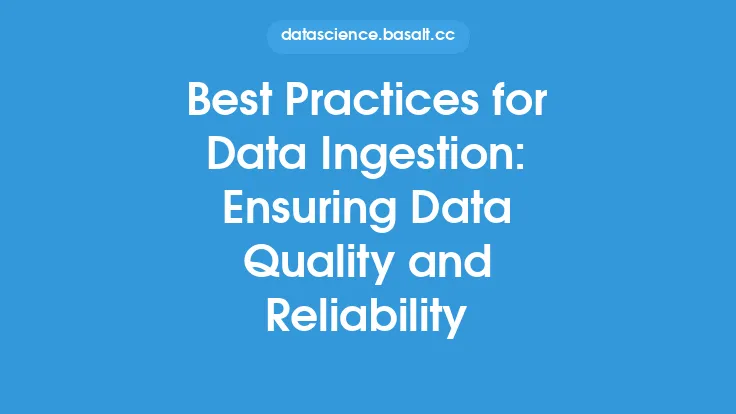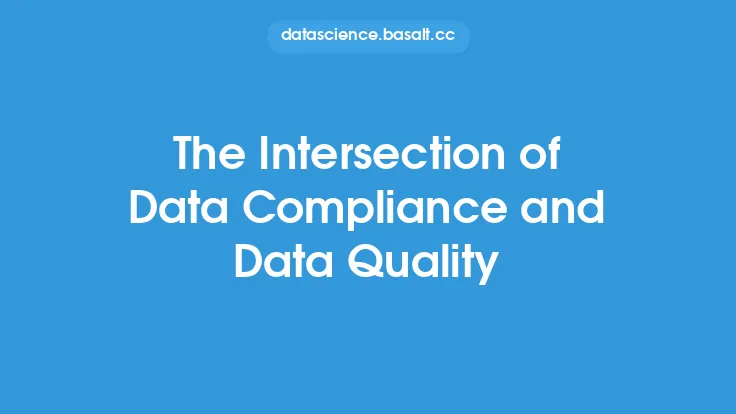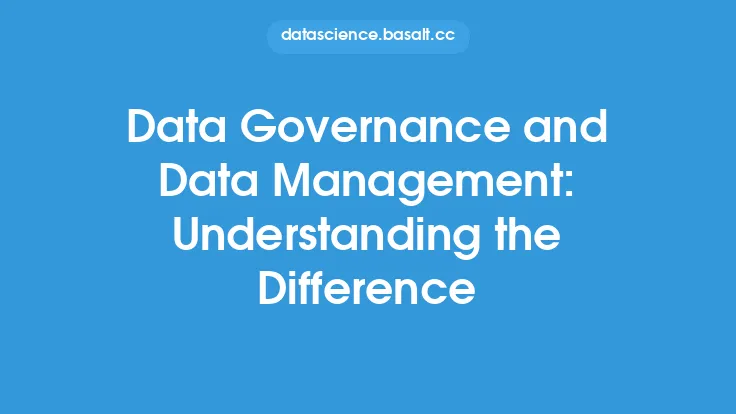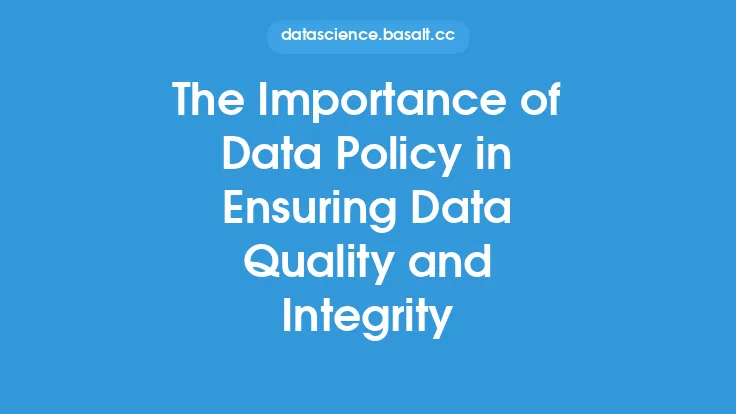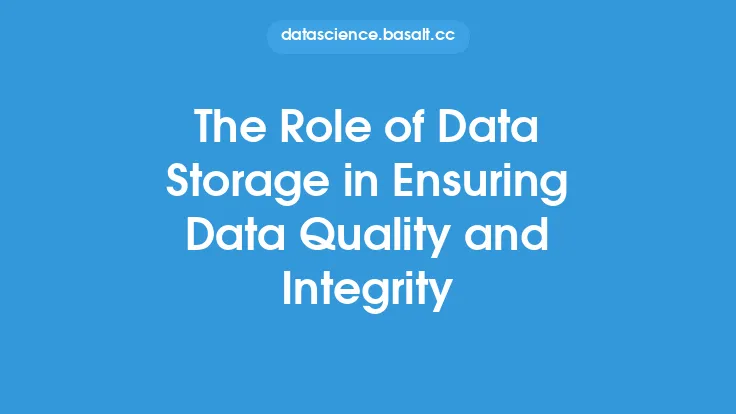Data warehousing has become an essential component of modern data management, enabling organizations to store, manage, and analyze large volumes of data from various sources. However, as data warehouses grow in size and complexity, ensuring data quality, security, and compliance becomes a significant challenge. This is where data warehouse governance comes into play, providing a framework for managing and overseeing the data warehouse environment to ensure that it meets the organization's data management needs and complies with regulatory requirements.
Introduction to Data Warehouse Governance
Data warehouse governance refers to the set of policies, procedures, and standards that govern the management and use of a data warehouse. It involves defining roles and responsibilities, establishing data quality and security standards, and ensuring compliance with regulatory requirements. Effective data warehouse governance is critical to ensuring that the data warehouse is reliable, secure, and provides accurate and consistent data to support business decision-making.
Key Components of Data Warehouse Governance
Data warehouse governance consists of several key components, including:
- Data quality management: This involves defining data quality standards, monitoring data quality, and implementing data cleansing and data validation processes to ensure that the data in the data warehouse is accurate, complete, and consistent.
- Data security management: This involves defining access controls, encrypting sensitive data, and implementing authentication and authorization mechanisms to ensure that the data in the data warehouse is secure and protected from unauthorized access.
- Compliance management: This involves ensuring that the data warehouse complies with regulatory requirements, such as data privacy laws, data protection laws, and industry-specific regulations.
- Data governance policies: This involves defining policies for data management, data quality, data security, and compliance, and ensuring that these policies are communicated to all stakeholders.
- Data governance procedures: This involves defining procedures for data management, data quality, data security, and compliance, and ensuring that these procedures are followed by all stakeholders.
Benefits of Data Warehouse Governance
Effective data warehouse governance provides several benefits, including:
- Improved data quality: Data warehouse governance helps to ensure that the data in the data warehouse is accurate, complete, and consistent, which is critical for supporting business decision-making.
- Enhanced data security: Data warehouse governance helps to ensure that the data in the data warehouse is secure and protected from unauthorized access, which is critical for protecting sensitive data and preventing data breaches.
- Increased compliance: Data warehouse governance helps to ensure that the data warehouse complies with regulatory requirements, which is critical for avoiding fines and penalties.
- Better decision-making: Data warehouse governance helps to ensure that the data in the data warehouse is reliable and trustworthy, which is critical for supporting business decision-making.
- Improved operational efficiency: Data warehouse governance helps to ensure that the data warehouse is well-managed and well-maintained, which is critical for improving operational efficiency and reducing costs.
Best Practices for Implementing Data Warehouse Governance
Implementing data warehouse governance requires a structured approach, and several best practices can help to ensure success. These include:
- Define clear roles and responsibilities: Clearly define the roles and responsibilities of all stakeholders, including data owners, data stewards, and data users.
- Establish data governance policies: Establish clear policies for data management, data quality, data security, and compliance, and ensure that these policies are communicated to all stakeholders.
- Implement data quality management processes: Implement processes for monitoring data quality, data cleansing, and data validation to ensure that the data in the data warehouse is accurate, complete, and consistent.
- Implement data security management processes: Implement processes for access control, encryption, and authentication to ensure that the data in the data warehouse is secure and protected from unauthorized access.
- Monitor and audit compliance: Monitor and audit compliance with regulatory requirements, and implement corrective actions to address any compliance issues.
Tools and Technologies for Data Warehouse Governance
Several tools and technologies can help to support data warehouse governance, including:
- Data governance platforms: These platforms provide a centralized repository for managing data governance policies, procedures, and standards.
- Data quality tools: These tools provide capabilities for monitoring data quality, data cleansing, and data validation.
- Data security tools: These tools provide capabilities for access control, encryption, and authentication.
- Compliance management tools: These tools provide capabilities for monitoring and auditing compliance with regulatory requirements.
- Data warehousing platforms: These platforms provide capabilities for managing and analyzing data in the data warehouse, and can help to support data warehouse governance by providing features such as data quality management, data security management, and compliance management.
Challenges and Opportunities in Data Warehouse Governance
Data warehouse governance presents several challenges and opportunities, including:
- Complexity: Data warehouse governance can be complex, especially in large and distributed environments.
- Cost: Implementing data warehouse governance can require significant investment in tools, technologies, and personnel.
- Culture: Data warehouse governance requires a culture of data governance, which can be difficult to establish and maintain.
- Opportunity for improvement: Data warehouse governance provides an opportunity to improve data quality, data security, and compliance, and to support business decision-making.
- Opportunity for innovation: Data warehouse governance provides an opportunity to innovate and improve data management practices, and to leverage new tools and technologies to support data warehouse governance.
Conclusion
Data warehouse governance is a critical component of modern data management, providing a framework for managing and overseeing the data warehouse environment to ensure that it meets the organization's data management needs and complies with regulatory requirements. By implementing effective data warehouse governance, organizations can improve data quality, enhance data security, increase compliance, and support business decision-making. While data warehouse governance presents several challenges and opportunities, it is essential for ensuring that the data warehouse is reliable, secure, and provides accurate and consistent data to support business decision-making.
